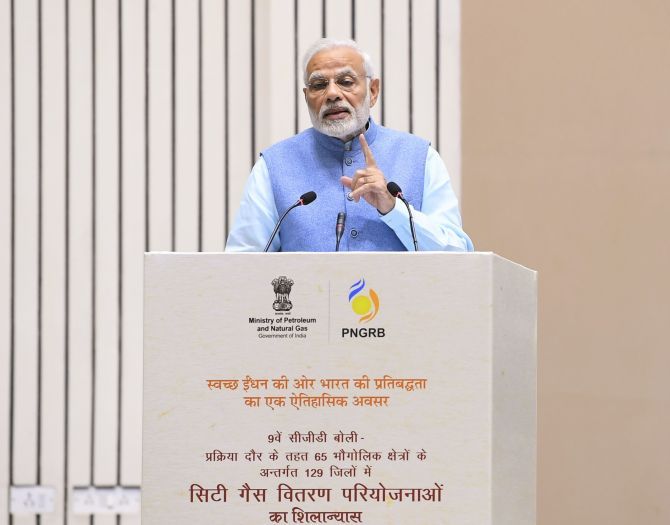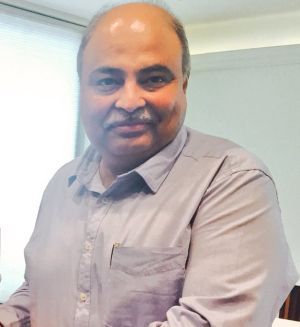 | « Back to article | Print this article |
'It is not that he has not committed any mistakes; he has.'
'But people were willing to forgive you if you were honest.'

Uday Mahurkar, author of two books on Narendra Damodardas Modi, is a deputy editor at the India Today group and has known the prime minister for more than three decades.
"As chief minister, he used to tolerate ministers who could deliver, but were not very clean. He tolerated them for delivery. But after coming to Delhi, he has stopped tolerating anybody who doesn't pass the test of integrity. Every officer has to pass the test of integrity," Mahurkar, below, tells Rediff.com's Shobha Warrier.
As the author of two books on Narendra Modi and as a person who has known him for three decades, was his victory in the Lok Sabha elections a surprise for you, or was it on expected lines?
At least to me, it did not come as a surprise at all.
When I wrote my second book on the three years of governance of Modi, I could find out the track he was on. People might say the Balakot attack was the trigger, but I would say Balakot was the icing on the cake. That is because he had already laid the foundation of good governance.
I would say the Direct Benefit Transfer and monitoring of welfare schemes through geotagged photos were the two reasons that contributed to his success.
DBT removed the middlemen and money reached into the accounts of the people directly. Before this, people had to grease the palms of clerks and others to get their cheque.
If you remember, Rajiv Gandhi made an honest statement that out of every one rupee, only 15 paise reached the beneficiary.
DBT was a tool started by the Manmohan Singh government, but it was Modi who took it to its logical end.
When he took over as prime minister in 2014, the number of people under DBT was 2.5 crore. Today, the number is 55 crore.
When tools of technology came into governance, the success rate improved by up to 40%. What was below 50% before 2014 in the delivery of welfare schemes in the country, Modi has taken it to beyond 80% to 90%.
Under Modi's housing scheme, more than 95% of the people got their houses at the same place with the same quality that was sanctioned by the government.
So, I would say, the foundation of Modi's victory was good governance.
But the image was that his governance was one of failure with high unemployment rate, farmers's distress, etc...
It is a very complex phenomenon.
Nobody can deny there is a problem in job creation.
Nobody can deny there is a problem in the farm sector.
But what overrode these factors was the Modi government's honesty.
Like what he told BJP workers, that if the government could convince its honesty of purpose to the people, they will believe you. It is not that he has not committed any mistakes; he has. But people were willing to forgive you if you were honest.
Do you feel calling him 'chor' boomeranged as the people believed in him and his honesty?
It definitely boomeranged. Those who have benefitted from his various schemes might have felt bad when the Congress was abusing Modi.
He started the 'Main Chowkidar Hoon' campaign and totally demolished the 'Chowkidar Chor Hai' campaign. It was like how he demolished Mani Shankar Aiyar's chaiwallah jibe with 'Chai Pe Charcha'. He did the same thing in 2019 also.
Basically, the Congress did not learn its lessons properly.
I was with Amit Shah on tour to UP, MP, Bihar, etc. I saw a wave, but the margins of 3 lakh to 5 lakh votes came as a surprise.
An incumbent prime minister emerging victorious with such huge margins is unprecedented...
It is unprecedented because if you compare Modi's victory to Jawaharlal Nehru's, you can say that Nehru had the advantage of being the leader of the freedom movement. So, this kind of victory is happening for the first time in independent India.
I have never seen such pro-incumbency in my life as a journalist. And it is built on multiple factors.
In the case of Indira Gandhi, the creation of Bangladesh was the reason (Note: The 1971 Lok Sabha election was held in March, Bangladesh was liberated in December that year.)
But in the case of Modi, it was not based on just one factor, but on multiple factors.
Which factor played the major role in his victory? Modi as a decisive leader or the welfare schemes?
All the factors played an equal role. Yes, Balakot certainly played a major role.
In December 2018, when many surveys predicted that the BJP would not win more than 200 seats, I did my own survey by talking to various sections of people. To my surprise, about 80% to 90% of people said Modi. This was before Balakot.

When the liberal elite call him a Hindutva leader, people from all spectrum of Indian society, from tribals to backward communities to young voters to women, have voted for him. How do you explain this?
He has become the leader of the poor. The entire constituency of the poor which, the Opposition parties claimed as theirs, voted for him.
If you listen to his speech after the victory, you will see that he has emerged as a statesman.
Let me say, he is emerging as a statesman in an Indian mould.
We did call Nehru a statesman, but he was a statesman in the Western mould. Modi's beliefs are based on the liberality and spirituality of Hindu philosophy. So, we have a statesman now who is rooted in Indian philosophy.
Nehru was also a statesman, but his statesmanship was rooted in Western concepts.
A statesman has to be a very just leader, just to every section of society. But Nehru was always partial to the minority community because he believed that they were the younger brothers, and so needed pampering. He believed that if they committed something wrong, the majority should tolerate it.
Those who call Modi a right-wing Hindutva leader should look at the policies of the Modi government. Implementation of the policies has been without any discrimination. Muslims have got homes, scholarship, etc.
The international media described Modi as a divisive leader even after he won more than 300 seats...
It is a very false campaign. I very strongly suspect it as a strong campaign driven by vested interests who do not want to see Modi as one of the world's leaders. They have exposed themselves totally now.
What is it about Modi that makes people either love him or hate him?
This election has proved that all those who are right thinking, all those who want India to rise above caste, politics and religion, are the ones who love Modi.
The Hate Modi brigade has their own agenda.
This election has been a great leveller in one sense. The margin of victory of the BJP candidates in the north Indian belt has been tremendous. It shows that Modi is an acceptable leader to all.
Modi's new slogan is 'Sabka Saath, Sabka Vikas, Sabka Vishwas'. Is it with real honesty that he is saying this? Or is it just a slogan for the election?
He truly believes in the slogan. He has dedicated himself to truthfulness.
Even when he is hard on the Opposition, it is part of Chanakya Neeti. It is very clear in Chanakya Neeti that you have to be truthful to the people of the country.
Muslim appeasement resulted in the Partition of the country and it was continued by the Congress party.
The election result is also anger against the Opposition parties and the Congress's Muslim appeasement.
But the criticism is that with this victory, India has become Hindustan...
No. India has become a truly secular country now.
We were following pseudo-secularism till now and Modi is moving towards real secularism.
Real secularism is when the law of the land treats every caste, every religion equally.
How different will Modi 2.0 from Modi 1.0? Will he take hard decisions this time, like building the Ram temple at Ayodhya?
He will take a very hard line on the issue of divestment.
He has promised to build the temple at Ayodhya, but he promised with a caveat, that it will be built with Sarva Sammiti under the court's direction.
Do you think history will remember Modi as the strongest leader independent India has seen?
Certainly. I have no doubt about it.
The way he reacted to the Pulwama attack, no leader has done so far.
The way he has tackled China also, though much more needs to be done on the trade deficit front as it is still very high. Nobody can deny that he put China in its place to some extent.
Will you place him above Indira Gandhi?
Bangladesh was a great feather in her cap, but she had many demerits.
Indira Gandhi was a strong leader, but then she allowed corruption, politics of nepotism and the Emergency to happen.
Narendra Modi is dismantling all these things.
If the readers of Rediff.com remember, I had predicted Modi's success, and the way Modi would be functioning, in April 2014 itself, just before he was elected to power.
I had said that the arrival of Modi in Delhi would be a big shock for the favour-driven culture of Delhi.
Do you feel with this kind of win, the importance and influence of what Modi calls the 'Khan Market gang', Lutyens's Delhi will wane soon?
It is already gone!
In the last three months, nobody has used the word secularism. We are moving from pseudo- secularism to true secularism.
Modi's USP is creating a sense of pride in our own abilities and nation.
You have observed Modi closely for several years. How has he changed over the years as a leader and a person?
The trajectory of Modi is that he has learnt and moved forward, and thus taken his level up.
I know him from the time he entered the BJP from the RSS, and I have been in touch with him from 1990 onwards.
I have seen him as the chief minister of Gujarat and all those stories of good governance from 2003 to 2010, were mine.
So, my criticism of Modi was also taken very seriously. When I criticise, it is taken as something quite objective as I am an admirer of Modi.
He has also changed a lot over the years. He was never a great listener before he became chief minister.
When you sit with him, he would like to talk more about himself and the topic of his interest. But now, he has become a great listener.
As chief minister, he used to tolerate ministers who could deliver, but were not very clean. He tolerated them for delivery.
But after coming to Delhi, he has stopped tolerating anybody who doesn't pass the test of integrity. Every officer has to pass the test of integrity.
Has he become more confident and also impatient?
He has become confident, not impatient.
When you want to reach the top in politics, you have to make small compromises in the beginning. If you aim for absolute perfection, you can't reach the top in politics.
I would say he used Chanakya Neeti to reach the top.
Is he an ambitious politician who enjoys being in power?
He enjoys being in power, but he has linked his ambition to the goodness of the country, and not personally.
That is the hallmark of a statesman; a statesman links his future with the future of the country.
When did you see that in him -- of connecting his own ambition with the ambition of the country?
It has always been there. I have no doubt that his first commitment has always been for the people.